Well, what a blast from the past. Remember the German trachea transplanters Heike and Thorsten Walles? Well, Heike Walles (formerly Mertsching) was found guilty of research misconduct by her former employer the University of Würzburg. A paper, celebrated 12 years ago as a bioengineering breakthrough to replace animal experiments, is about to be retracted. Over five years after Heike Walles herself requested the retraction, which Elsevier duly ignored since.
To briefly recap: Heike and Thorsten met at the Hannover Medical School, where she at that time was married to the university’s biosecurity expert Jürgen Mertsching. Thorsten was a young surgeon in training, mentored by….
Yes, the deadly thoracic surgeon who till this day remains adjunct professor at the MHH, started his trachea transplants there. Back then, he not only mentored Thorsten Walles, but also was the direct boss of the aspiring assistant professor of regenerative biology, Heike Mertsching. The team aimed to grow organs, specifically “bio-artificial” tracheas, and presiding over all this was the cardiac surgeon Axel Haverich, who was determined to use this combined regmed expertise to create in his lab a beating human heart.
Soon enough, in 2004, Heike and Thorsten Walles declared a piece of decellurised pig intestine, seeded with some cells, to be a regenerated artificial trachea (because they said so), a patch of which they, together with Macchiarini, transplanted into a cancer patient. The patient, apparently terminally ill, died some months after, his fate was kept secret presumably as not to confuse the scientific community. It seems no ethics approval was obtained, the human experiment was passed off as a compassionate use, the Walleses and Macchiarini published several papers about it, all parading that pointless transplant as a success (MacChiarini (sic!) et al 2004, Walles et al, 2004. Walles et al 2005). Later, the Walleses demanded from me in court the full scientific credit for this operation, insisting that Macchiarini was merely their humble assistant.
Based on breakthroughs like this and a bunch of preclinical papers with what appears to be falsified data, Heike Walles got a professorial job at the Fraunhofer Institute for Interfacial Engineering and Biotechnology (Fraunhofer IGB) in Stuttgart, her new husband followed to work as surgeon at the neighbouring Robert Bosch Hospital, Klinik Schillerhöhe.
And this is where the fun really started. As their mentor Macchiarini, the Walleses didn’t believe in animal experiments, also for them it was enough to just dishonestly claim they have done those while recruiting prospective human participants. In 2007, a heavily ill patient was talked into receiving a piece of decellurised pig intestine as a graft, first into his arm, then into his own windpipe. The patient suffered a multi-organ failure and bled to death soon after the tracheal transplant operation. But even that disaster the Walleses twisted into a success story: they described only the parallel treatments of this patient but not the transplant itself, as if it never happened, just as the patient’s death went unmentioned (Walles et al 2008, Mertsching et al 2009). Also here, no proper ethics approval was obtained.
One would have expected the Walleses to stop after this fiasco, or at least for their employers to stop this couple. But no. Probably because Macchiarini, by then in Spain, became a world star in 2008 with his first trachea transplant, his two former mentees became Germany’s great hope to catch up and share the fame.
So in 2009, an India-born man who just tried to commit suicide by drinking oven cleaner and ended up with, among other things, a destroyed windpipe, presented at Thorsten Walles’ office. What followed was not a life-saving compassionate use operation, the mentally unstable patient was medically fine under the circumstances and conservative therapy options were available. He was also told lies about alleged successful animal experiments (there were none done) and alleged successful previous trachea transplants in humans (no mention of the previous failure and death), and once again no proper ethics vote was obtained. Nobody seemed bothered that a suicidal patient in psychiatric treatment cannot give informed consent, but again, everyone was chasing the regenerative medicine glory, so the pig intestine operation took place.
Of course the decellurised pig intestine did not succeed to replace living human trachea tissue, the Indian man suffered, underwent many operations (Thorsten Walles wasn’t involved anymore, go figure why), and eventually he took his life. But in Walles’ peer-reviewed paper Steinke et al 2015, the patient is forever alive, cured and playing football. This is also why both Walles got recruited as full professors to the University of Würzburg and showered with governmental research grants, €10 million alone to build a centre for “Regenerative Therapies for Oncology and Musculoskeletal Diseases”. A book was published in 2015 about life-saving doctors celebrated Thorsten Walles and his tracheal transplants. Heike Walles, an expert on not obtaining ethics approvals, became in 2010 a member of the German national ethics council (Ethikrat) where for two years she advised the government on biomedical ethics.
Around 2009, Germany reformed its hospital exemption regulations on compassionate use treatments, and Thorsten Walles got in serious trouble over his last tracheal transplant operation, apparently done illegally since lacking an ethics approval. Eventually the couple was also barred from performing their scheduled tracheal transplants even on pigs, the authorities found those unsafe and unjustified towards pigs. The Walleses continued with lab work, some of which proved to contain manipulated data.
In late 2016, I mentioned Walles’ tracheal transplants in an article about Macchiarini’s colleagues. They swiftly sued me (the lawsuit ended with a settlement), insisting that their trachea transplants were successful and the corresponding author Macchiarini had zero contribution to this published technology.
As a lawsuit went on, a first paper by Walles was flagged for data manipulation. It paraded an alleged breakthrough in liver regeneration technology for which the authors were at that time showered with prizes and cash rewards, because this patented biological vascularised scaffold (BioVaSc®) technology promised to replace animal experiments. Fraunhofer IGB was immensely proud, and so was University of Würzburg. Here a 2016 article where Walles’ colleague Jan Hansmann eagerly markets this BioVasc “bioreactor”, where skin, liver or heart tissue can be created out of pig intestine, reminding us how such a tracheal patch saved a patient’s life, with more lives to be saved soon. When Walles sued me, Hansmann came to help, insisting that it was no true that no animal tests were done before the Walleses experimented on human patients. Yet I was right, and Hansmann was wrong.
Despite all this bullshit, and being coauthor on the fraudulent BioVasc paper, Hansmann remains a Fraunhofer-appointed professor in Würzburg, continuing to work on this same bioreactor technology now exposed as fraudulent. No sanctions at all for him.
Now here is this paper which will soon be retracted:
Johanna Schanz , Jacqueline Pusch , Jan Hansmann , Heike Walles Vascularised human tissue models: a new approach for the refinement of biomedical research Journal of Biotechnology (2010) doi: 10.1016/j.jbiotec.2010.03.015

Kirstin Linke, Johanna Schanz, Jan Hansmann, Thorsten Walles, Herwig Brunner, Heike Mertsching Engineered liver-like tissue on a capillarized matrix for applied research Tissue Engineering (2007) doi: 10.1089/ten.2006.0388
I reported the Walleses to University of Würzburg for suspected research misconduct, including in this paper, over 5 years ago.
Schanz et al 2010 is about to be retracted now, it also turned out there was more than just the forged figure. The paper’s text is around 50% recycled, mostly self-plagiarism, but also occasional bits from unrelated sources. It also turned out that in March 2017, Heike Walles requested a retraction of her paper. The retraction request was passed on by the journal’s editor to the publisher Elsevier and then ended up in trash. The likely reason: just before that, the University of Würzburg ruled that the image duplication was OK, and also that all trachea transplants were scientifically and medically justified. The Walleses had no case to answer.
But I appealed that decision, also because my readers found more manipulated data in other Walles papers. The commission had to deliberate again, and even replace their biased medical expert.
A classic academic solution was soon found: the university was unfortunately unable to convince their two problematic faculty members not to depart for a distant place (let’s put it this way). The same year 2017, Thorsten Walles left the University of Würzburg for the University of Magdeburg, almost 400km away. Heike Walles followed her husband to Magdeburg the next year, in 2018. Now, any German academic will tell you that leaving University of Würzburg for Magdeburg is, ahem, not necessarily a good career move.

In this world-renowned top-ranking elite university in this East German region chiefly famous for its popular support for the far-right AfD, Heike Walles is now curing COVID-19 (her only running DFG grant which she shares with 2 other Magdeburg professors), while Thorsten Walles claims to be still doing research on “bio-artificial human airway model”, not sure with which money because the DFG doesn’t fund him for years already. I wonder if the University of Magdeburg really plans to revive the old decellurised pig intestine technology and let Walles do more of his tracheal transplants, but nobody is answering my emails there.
Anyway, because both Walleses are gone, the brave men and women of University of Würzburg decided that it was safe enough to have another look at my misconduct allegations from 5 years ago. This is what they found, in their letter to me from 16 May 2022 (translation mine):
“Regarding the person concerned Prof. Dr. T.W., the commission discontinued the procedure in accordance with Section 14 (3) of the GWP [Good scientific practice, -LS] guidelines at its meeting on October 11, 2021. In the proceedings against the person concerned, Prof. Dr. H. W., scientific misconduct was attested at this meeting as well as by resolutions from the March and April 2022 regarding the publication Schanz et al., J Biotechnol 2010; 148:56-63 according to § 7 paragraph 1 No. 1 lit. b of the GWP guidelines, and the procedure has been otherwise discontinued in accordance with Section 14 (3) of the GWP guidelines. A recommendation was issued to the university management regarding the concerned H. W., to demand a retraction of the publication from both the Journal of Biotechnology and the publisher of the journal. In addition, the recommendation was made that the the employer of the person concerned is to be informed about the finding of scientific misconduct as well as to notify the Hannover Medical School (“MHH”) about the outcome of the procedure.
I. The concerned Prof Dr. T.W.
According to Section 8 Paragraph 1 Sentence 1 of the GWP guidelines, the commission’s investigative task is based on scientific scientific misconduct “at the university”. It follows that a responsibility of the Commission exists only with regard to actions taken during the employment of the person concerned at the University of Würzburg.
During this time, the person concerned did not collaborate on any of the publications that are the subject of the publications. Even if one wanted to assume, during an employment at the University of Würzburg there could be a jurisdiction for misconduct from the period before the start of employment, with the argument of closing investigative gaps, this ended in any case with the termination of T. W.’s employment relationship on 31 December 2017. In addition, the MHH issued retraction demands for the publications, so that in this respect a sanction has already been imposed.
Furthermore, the compassionate use experiments, whose scientifically relevance is in any case doubtful, and which MHH justifiably did not classify as scientific misconduct, were carried out at a time when the concerned person was not yet employed at the University of Würzburg.
II. Affected Prof. Dr. H.W.
- Jurisdiction
The publications from the years 2003 to 2006 as well as the compassionate use experiments, which were the subject of the notification, took place in the period before the start of employment of the persons concerned at the University of Würzburg. A jurisdiction thus ended according to the above statements regarding the Commission’s investigative task, in any case upon termination of the employment relationship on October 31, 2018. The article Schanz et al., J Biotechnol 2010; 148: 56-63 was however published during the period of activity of those affected at the University of Würzburg, so
that there is a jurisdiction in this respect. - Determination of scientific misconduct
The Commission considers it proven that Fig. 4C of the publication Schanz et al., J Biotechnol 2010; 148.’ 56-63 corresponds to the Figure 4D in Linke et al., Tissue Eng 2007; 13: 2699-707. The figure has been duplicated and used to represent different facts. This duplication and the incongruity between the figure and the figure text in the publication in J Biotechnol was confirmed in the session of December 13 December 2021. It is therefore an objective misrepresentation in the sense of § 7.1.1.b of the GWP guidelines.
Scientific Misconduct in the sense of Section 7 (1) of the GWP guidelines presumes on subjective level gross negligence or intent. To the knowledge of the Commission, in the relevant discipline attention is paid to ensure that no image is used twice for publication, especially since to prove different statements. That diligence would have been all the more necessary in the present case as the figure was central for the statement of the article and represented a significant result of the lab’s research. Gross negligence is therefore present. It is not required to prove the intent to deceive for the affirmation of the facts of § 7.1 of the GWP guidelines. - Recommendation of an appropriate sanction
The circumstances of the individual case are decisive for the assessment, § 15.2 of the GWP guidelines. The retraction is urgently required due to image duplication and incongruity between the figure and the figure text, which the person concerned explicitly confirms. In addition, the Commission also finds it appropriate to inform the current employer of the persons concerned about the finding of scientific misconduct.
The commission forwarded its final report to the university management on May 10, 2022. A decision will be made there on how to proceed.”
Heike and Thorsten Walles did not reply to my email. I asked the University of Würzburg why their report doesn’t mention that Schanz et al 2010 contains around 50% recycled text. The head of the ethics committee told me that they decided to focus on the image duplication because
“… a research misconduct according to § 7.1.2.a of the GWP guidelines (plagiarism) can only be considered when foreign-source plagiarism is present.“
This Würzburg law professor also informed me that the Fraunhofer Society did investigate the trachea transplants and the alleged data manipulations in the Walles papers, but he cannot inform me of the outcome, only Fraunhofer can.
But the Fraunhofer Society doesn’t communicate with me. And neither did any of the relevant Walles papers receive a retraction or even a measly correction so far. It is as if the sacrifices of these two deceased patients were less valuable than the massive governmental cash that Fraunhofer institute is still making with them. The state prosecutor informed me that they dropped a criminal investigation against Thorsten Walles because of statute of limitations: the operations took place too long ago. All that is left of these patients is a book celebrating their surgeon and the life-saving miracles of his wife’s regenerative medicine.

There are other things from the Würzburg decision letter to untangle. Like this regarding Thorsten Walles:
“..the MHH issued retraction demands for the publications, so that in this respect a sanction has already been imposed.
Furthermore, the compassionate use experiments, whose scientifically relevance is in any case doubtful, and which MHH justifiably did not classify as scientific misconduct…”
It is not clear why the Hannover Medical School did not find any misconduct in the 2003 tracheal patch transplant done by the Walleses and Macchiarini, it didn’t have an ethics approval even. But then again, MHH has a strange nostalgic relationship with Macchiarini, in fact the only reason this killer surgeon can still call himself Professor is because of the adjunct title MHH grants him in absentia against state’s regulations. For same reason, the Macchiarini-supervised MD dissertation of his acolyte Philipp Jungebluth has been exempt from investigation by rector’s decree despite MHH’s knowledge that the 2008 trachea transplant in Barcelona (the subject of this thesis) was fraudulent and hair-raisingly unethical. And an utter failure, known to Jungebluth and Macchiarini long before that dissertation was submitted to claim a miraculous success story.
But then again, the head of ethics committee in Würzburg insisted that from the side of MHH “sanctions respectively retraction demands were declared regarding the publications“. Notice – they may have issued sanctions against the publications, but not against these publications’ authors.
Yet these retractions didn’t happen yet, maybe Elsevier is blocking again. Or maybe MHH misinformed the University of Würzburg about retraction requests. I believe there were no retraction requests and no misconduct findings at MHH because of this Erratum:
Thorsten Walles, Arthur Lichtenberg, Carmen Puschmann, Rainer Leyh, Mathias Wilhelmi, Klaus Kallenbach, Axel Haverich, Heike Mertsching, “In vivo model for cross-species porcine endogenous retrovirus transmission using tissue engineered pulmonary arteries” Eur J Cardiothorac Surg, (2003) DOI: 10.1016/s1010-7940(03)00334-8


The Erratum from February 2022 merely stated:
“The authors regret, that initially the right to reproduce figures 1a and 1 b was not obtained. This has now been done and the figure legend has been updated accordingly.”
Now, it was not just inappropriate data reuse disguised as a copyright error. That gel figure, in both papers, was completely fake.

And everyone knew it was fake, because I told them. The journal editors, the publishers, the Universities of Würzburg and Magdeburg, and of course also the MHH knew, who then decreed that a copyright notice was the appropriate solution.
Do not expect MHH to actually retract this trio of fake papers either:
Rainer G Leyh, Mathias Wilhelmi , Philip Rebe , Stefan Fischer , Theo Kofidis , Axel Haverich , Heike Mertsching In vivo repopulation of xenogeneic and allogeneic acellular valve matrix conduits in the pulmonary circulation The Annals of Thoracic Surgery (2003) doi: 10.1016/s0003-4975(02)04845-2


Or this duo, also from MHH, featuring Macchiarini even (really look whom MHH is protecting here once again):
C Biancosino, P Zardo, T Walles, I Wildfang, P Macchiarini, H Mertsching, “Generation of a bioartificial fibromuscular tissue with autoregenerative capacities for surgical reconstruction” Cytotherapy, (2006) DOI:https://doi.org/10.1080/14653240600621166

Also these gels are fabricated, fake. The first two lanes are identical, the third not.

The announcement that MHH ordered retractions is not credible, simple as that. All MHH has ordered was one measly Erratum to cover up for rigged microscopy and fake gel figures.
It is perfectly clear that the MHH needed to save the already badly dented reputation of their bigwig clinic head, Axel Haverich, co-author on several problematic papers, and former patron of Macchiarini and both Walleses.
I am not sure MHH is safe for patients with an attitude like this.
It also seems that the national research integrity authority, the DFG, was not involved in the investigation of Walles’ publications. I don’t understand how that happened, but the outcome is what you just read.
But at least there was that one paper by Heike Walles from her Würzburg lab, Schanz et al 2010, where misconduct was found. All because of a journal editor who has been fighting to retract this paper since 2017. Will Elsevier finally allow it?
The Walleses have started anew as respected professors in Magdeburg, teaching students, training early career researchers, curing COVID-19, getting awards, etc. The university is very proud of their two zombie scientists and never reacted to any of my emails.
Update 21.01.2023
The retraction announced above took place in November 2022:
“Apparently, no permission was obtained to re-publish the image, as the authors did not provide us with a copy of a release issued by Mary Ann Liebert Inc. with an authorization to re-publish the figure initially published in Linke et al. (2007) in J. Biotechnology. In this case, this infringes on the copyright of Mary Ann Liebert Inc. […]
The authors have also (self)plagiarized significant text sections from:•
Genes Nutr. 2009 September; 4(3): 165-172 Penza, Jeremic, Montani, Unkila, Caimi, Mazzoleni, Diego Di Lorenzo PMCID: PMC2745740 DOI: 10.1007/s12263-009-0214-7 Springer-Verlag 2009•
Van den Belt K, Berckmans P, Vangenechten C, Verheyen R, Witters H (2004) Comparative study on the in vitro/in vivo estrogenic potencies of 17beta-estradiol, estrone, 17alpha-ethynylestradiol and nonylphenol. Aquat Toxicol 66(2):183–195•
Generation and Transplantation of an Autologous Vascularized Bioartificial Human Tissue. (2009) Clinical and Translational Research Transplantation; 27 July 2009 – Volume 88 – Issue 2 – pp 203-210 Heike Mertsching, Johanna Schanz, Volker Steger, Markus Schandar, Martin Schenk, Jan Hansmann, Iris Dally, Godehard Friedel, & Thorsten Walles”
Now the following thing happened.
Matthias Gaestel, MHH professor and deputy head of the university’s Commission for Good Scientific Practice, posted this on PubPeer, for seven Walles papers:
” This publication was the subject of an investigation by the Commission for Good Scientific Practice (GSP Commission) of Hannover Medical School (MHH). Upon recommendation of the Commission, the MHH President requested the authors to retract this publication in April 2019. As this publication has still not been retracted by January 12, 2023, the MHH President has instructed the Chair of the GSP Commission to publish this commentary.”
It’s seven papers in total slotted for retractions which so far didn’t happen. Let’s start with a preclinical paper which soon led to Walleses’ disastrous tracheal patch transplants in Stuttgart (the first one was done with Macchiarini at MHH):
Heike Mertsching , Thorsten Walles , Michael Hofmann , Johanna Schanz , Wolfram H. Knapp Engineering of a vascularized scaffold for artificial tissue and organ generation Biomaterials (2005) doi: 10.1016/j.biomaterials.2005.04.048
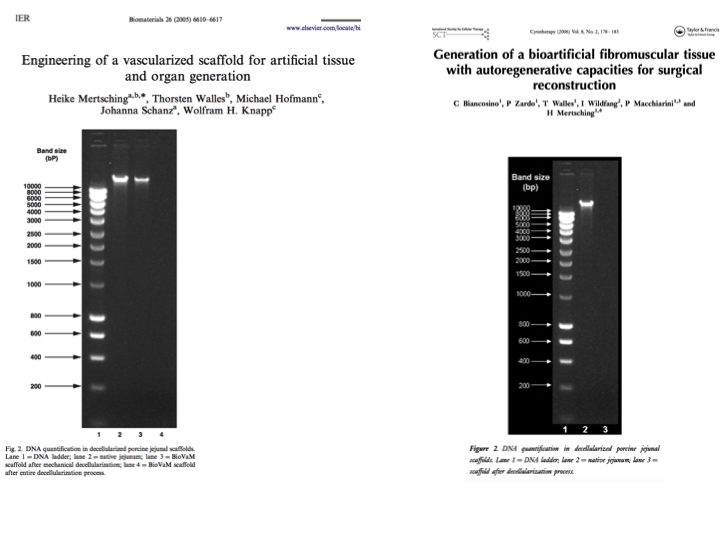
Same gel, different experiments, in one case the gel lane with the right-most band was digitally erased. Here a set of three papers with recycled data:
Klaus Kallenbach , Rainer G. Leyh , Elena Lefik , Thorsten Walles , Matthias Wilhelmi , Serghei Cebotari , Andreas Schmiedl , Axel Haverich , Heike Mertsching Guided tissue regeneration: porcine matrix does not transmit PERV Biomaterials (2004) doi: 10.1016/j.biomaterials.2003.10.040
Rainer G Leyh , Mathias Wilhelmi , Philip Rebe , Stefan Fischer , Theo Kofidis , Axel Haverich , Heike Mertsching In vivo repopulation of xenogeneic and allogeneic acellular valve matrix conduits in the pulmonary circulation The Annals of Thoracic Surgery (2003) doi: 10.1016/s0003-4975(02)04845-2
Thorsten Walles , Heidi Görler , Carmen Puschmann , Heike Mertsching Functional neointima characterization of vascular prostheses in human The Annals of Thoracic Surgery (2004) doi: 10.1016/j.athoracsur.2003.08.048
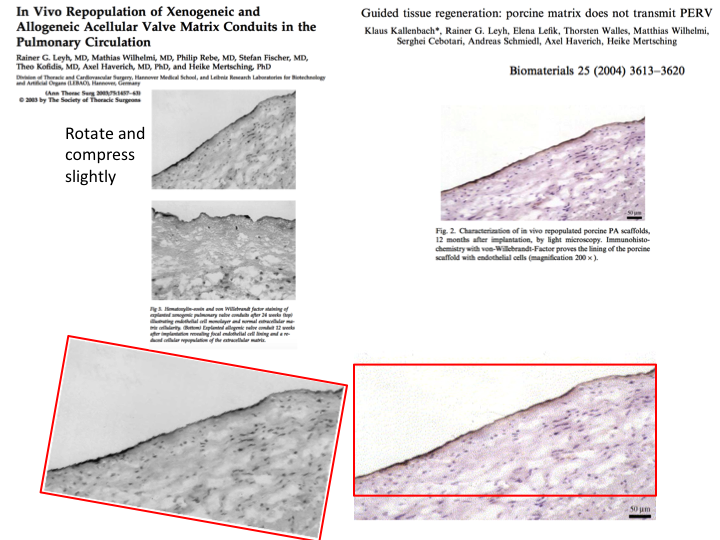
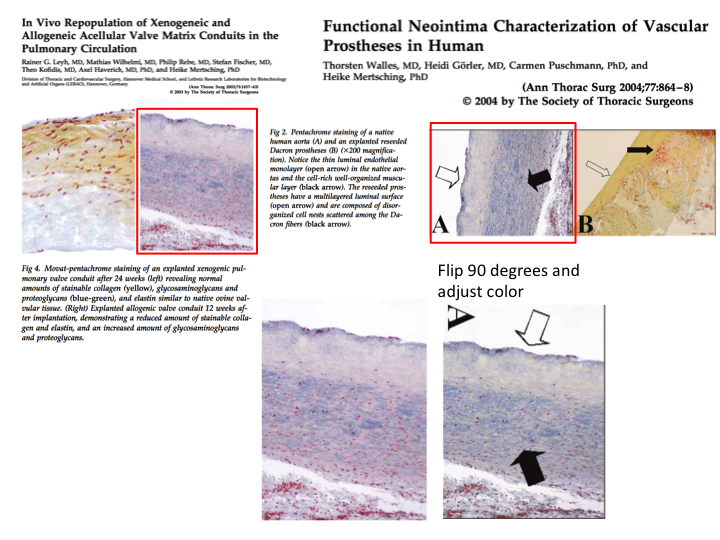
One of Walleses coauthors there is their former MHH Über-boss, the almighty heart surgeon and entrepreneur Axel Haverich (read below).
Regenerating in Hannover, Part 2: Axel Haverich’s “growing” heart valves
The science of the fallen star of regenerative medicine Paulo Macchiarini was simple: take a dead organ, strip it of its cells and seed the carcass with stem cells (usually the magic cells from bone marrow). After some days in a “bioreactor”, you take out a living trachea, esophagus, even heart, and implant it into a…
Regenerating in Hannover, Part 1: how Macchiarini got ideas
The trachea surgeon and formerly world-renowned stem cell pioneer Paolo Macchiarini, whose human experimenting left most of his trachea-transplant patients dead or in permanent emergency care, certainly did not intend to restrict himself to regenerating airways. He wanted to grow hearts, and he was likely to have been inspired by his former colleagues in Hannover,…
Here are three more Walles papers with Haverich to be retracted:
Thorsten Walles , Arthur Lichtenberg , Carmen Puschmann , Rainer Leyh , Mathias Wilhelmi , Klaus Kallenbach , Axel Haverich , Heike Mertsching In vivo model for cross-species porcine endogenous retrovirus transmission using tissue engineered pulmonary arteries European Journal of Cardio-Thoracic Surgery (2003) doi: 10.1016/s1010-7940(03)00334-8
Thorsten Walles , Tanja Herden , Axel Haverich , Heike Mertsching Influence of scaffold thickness and scaffold composition on bioartificial graft survival Biomaterials (2003) doi: 10.1016/s0142-9612(02)00490-8
R.G Leyh , M Wilhelmi , T Walles , K Kallenbach , P Rebe , A Oberbeck , T Herden , A Haverich , H Mertsching Acellularized porcine heart valve scaffolds for heart valve tissue engineering and the risk of cross-species transmission of porcine endogenous retrovirus Journal of Thoracic and Cardiovascular Surgery (2003) doi: 10.1016/s0022-5223(03)00353-2
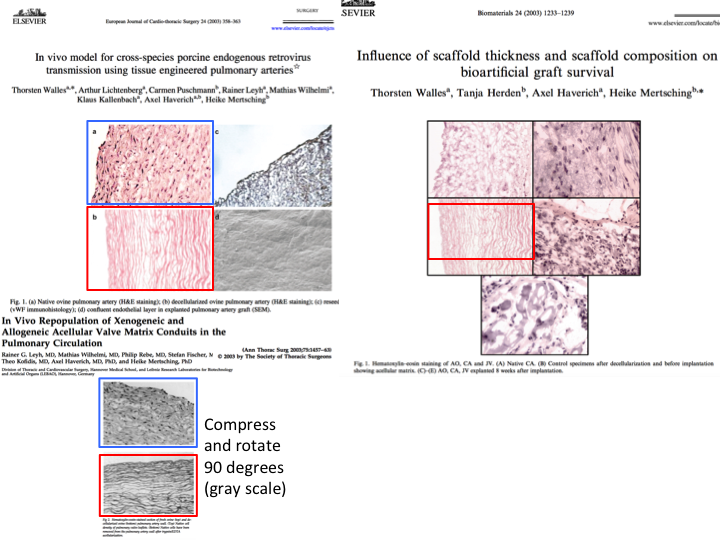
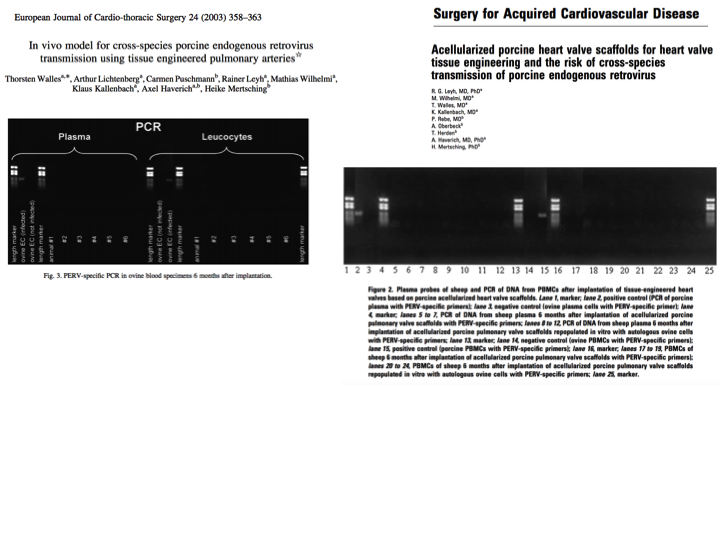
In November 2021, the publisher Oxford University Press however decided that MHH investigators can piss off with their retraction requests and issued a Corrigendum instead:
“The authors regret, that initially the right to reproduce figures 1a and 1 b was not obtained. This has now been done and the figure legend has been updated accordingly.”
The Editor-in-Chief of European Journal of Cardio-Thoracic Surgery is the German surgery professor at the University of Freiburg, Matthias Siepe. I guess this is how German ethics work for trachea transplanters!
Karolinska gets taught German medical ethics
In the aftermath of the scandal around Paolo Macchiarini, which left many patients dead, his former employer Karolinska Institutet requested a retraction a paper. The Swiss-German medical publisher Karger and its journal Respiration however categorically refused and ordered KI not “to patronize the readers of the journal ‘Respiration’.” The German Editor-in-Chief had namely a huge…
I asked the MHH investigator Gaestel for the investigative report or its summary (with 7 retraction requests, there must have been research misconduct findings!). Gaestel announced to check with his commission colleagues.
I contacted the editors of the affected journals, the Fraunhofer Institute for Interfacial Engineering and Biotechnology (Fraunhofer IGB) in Stuttgart (responsible for more fake papers and two disastrous tracheal transplants in humans), and Walles’ current employer, the University of Magdeburg (where they are treated like science stars). It is still unclear if Fraunhofer ever did their own investigation as agreed with the MHH and the Universiyt of Würzburg, but it becomes rather clear that the Magdeburg leadership knew about the 7 retraction requests since 2019 and never ordered Walleses to comply with them.
I thank all my donors for supporting my journalism. You can be one of them!
Make a one-time donation:
I thank all my donors for supporting my journalism. You can be one of them!
Make a monthly donation:
Choose an amount
Or enter a custom amount
Your contribution is appreciated.
Your contribution is appreciated.
DonateDonate monthly





Pingback: Lacché politici, ben retribuiti – ocasapiens
Pingback: Hannover Scheibenkleister – For Better Science - Utile All